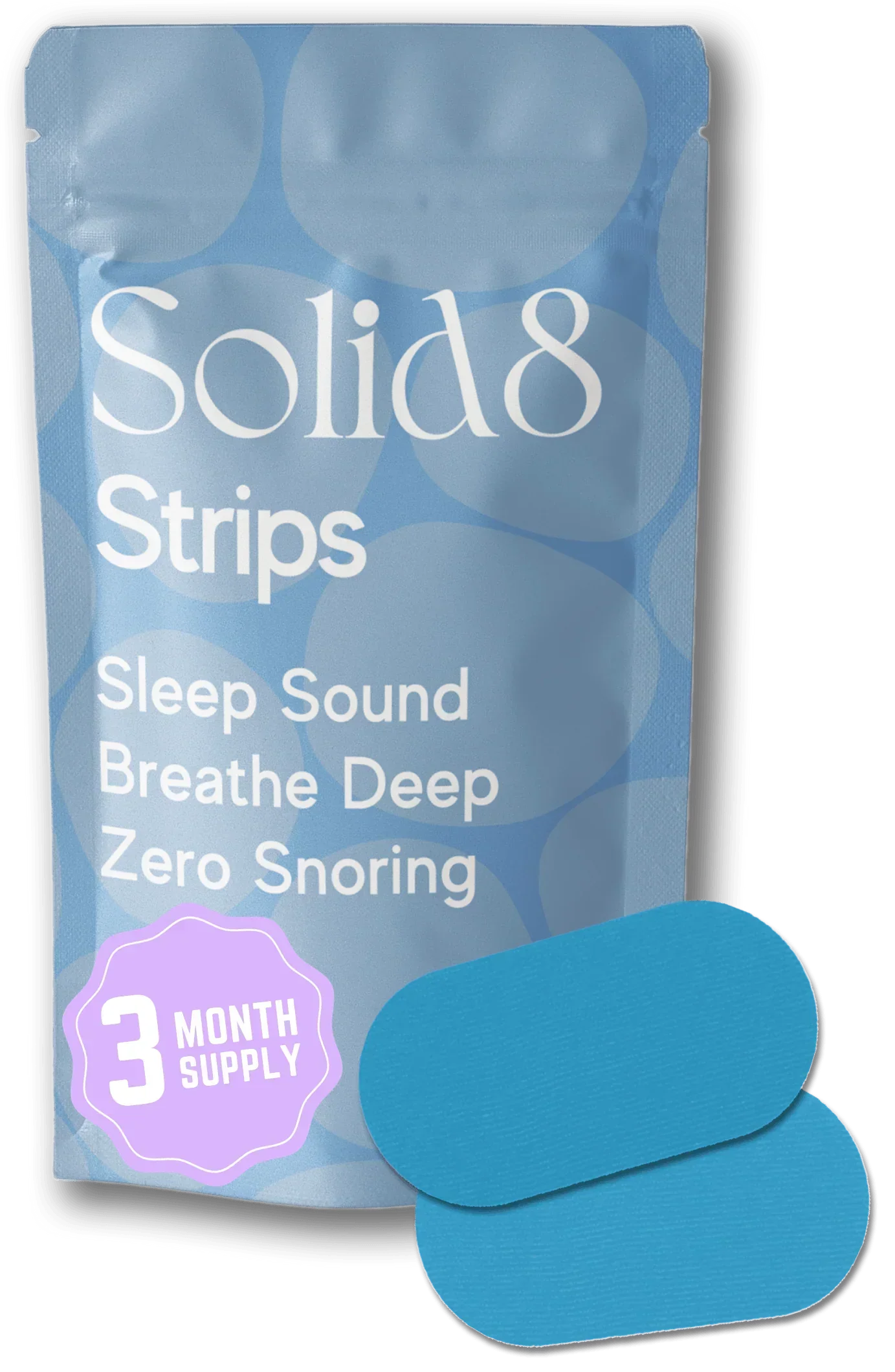
Why Mouth Breathing Causes Dry Mouth and How to Fix It
Share
Breathing through your mouth instead of your nose can lead to a dry and uncomfortable mouth. This is a common issue for many people, especially during sleep. Let's explore why this happens and what steps you can take to address it.
Key Takeaways
- Mouth breathing bypasses the nose's role in filtering and humidifying air
- It can result in dry mouth, bad breath, tooth decay, and snoring
- Mouth taping encourages nasal breathing during sleep
- Solid8 Sleep Mouth Tape offers a comfortable and safe option for nighttime use
- Staying hydrated and using a humidifier can also alleviate dry mouth
Understanding Mouth Breathing
Mouth breathing occurs when air enters the body through the mouth rather than the nose. This can be due to nasal congestion, structural issues, or simply habit. The nose plays a crucial role in warming, humidifying, and filtering the air before it reaches the lungs.
Many individuals may not realize they breathe through their mouths, particularly during sleep. This can lead to dry mouth, which is not only uncomfortable but can also contribute to other health concerns.
Nasal breathing is important because it allows the nose to produce nitric oxide, a gas that enhances oxygen uptake in the lungs. Mouth breathing bypasses these benefits, potentially impacting overall health.

How Mouth Breathing Leads to Dry Mouth
Breathing through the mouth can quickly dry out saliva, the mouth's natural lubricant and protector. Saliva is essential for maintaining oral health by neutralizing acids and washing away food particles. A lack of sufficient saliva leads to a dry, uncomfortable mouth, especially noticeable after a night's sleep without water intake.
Dry mouth can contribute to issues like bad breath, tooth decay, and snoring. Addressing mouth breathing is important to prevent these potential problems.
Without adequate saliva, harmful bacteria can thrive, increasing the risk of gum disease and cavities. Additionally, mouth breathing can cause the soft tissues in the throat to vibrate more, leading to snoring and disrupted sleep.
Solutions for Mouth Breathing and Dry Mouth
There are several strategies to reduce mouth breathing and alleviate dry mouth. One effective method is mouth taping, which involves gently applying a specialized tape over the lips to encourage nasal breathing during sleep.
While the idea might seem unusual, mouth taping is a safe and simple technique to promote nasal breathing. It can help reduce dry mouth, minimize snoring, and improve overall sleep quality.
Practicing nasal breathing during the day can strengthen the associated muscles, making it easier to maintain this habit at night. Addressing nasal congestion through saline rinses or managing allergies can also facilitate better nasal airflow.
Introducing Solid8 Sleep Mouth Tape
If you're considering mouth taping, Solid8 Sleep Mouth Tape is designed specifically for comfortable and effective use during sleep. Its features include:
Key Features of Solid8 Sleep Mouth Tape
- Hypoallergenic adhesive: Gentle on the skin
- Flexible woven fabric: Ensures comfort throughout the night
- CPAP compatible: Suitable for use with CPAP machines
- Beard-friendly: Works effectively even with facial hair
- User-friendly: Easy to apply and remove
Using Solid8 Sleep Mouth Tape is straightforward. Simply place a strip over your lips before bedtime. The tape is designed to be breathable and allows for mouth movement if necessary, so you can rest assured it won't feel restrictive.
The gentle adhesive minimizes skin irritation, and the flexible fabric adapts to facial movements during sleep. It's also compatible with CPAP machines, making it a viable option for those managing sleep apnea.
Other Tips for Managing Dry Mouth
In addition to mouth taping, consider incorporating these practices to help reduce dry mouth:
Tips for Managing Dry Mouth
- Stay hydrated by drinking water throughout the day
- Use a humidifier in your bedroom to add moisture to the air
- Avoid caffeine and alcohol before bedtime
- Practice nasal breathing during waking hours
- Consider using Solid8 Sleep Mouth Tape
Adequate hydration supports saliva production, essential for oral health. A humidifier can help maintain optimal humidity levels in your sleeping environment, preventing dryness of the mouth and nasal passages. Reducing intake of dehydrating substances like caffeine and alcohol before sleep can also be beneficial.
Consistently practicing nasal breathing can help your body adapt, making it easier to maintain this habit during sleep. If you continue to experience dry mouth or difficulty breathing through your nose, it's advisable to consult a healthcare provider for personalized advice.
Conclusion
Mouth breathing can lead to dry mouth and impact overall well-being. By understanding the causes and implementing strategies to promote nasal breathing, you can improve sleep quality and oral health.
Trying methods like mouth taping with products such as Solid8 Sleep Mouth Tape may offer significant benefits. It's a simple, non-invasive approach that can enhance your breathing patterns and reduce discomfort caused by dry mouth.
Adapting to nasal breathing may require patience and practice, but the potential improvements in sleep and health are worthwhile. Consider incorporating these techniques into your routine and experience the positive changes they can bring.
Special Offer: Sleep Better for Less!
For a limited time, use code "RESTFUL" at checkout to enjoy 10% off your first order. Don't miss out on this exclusive deal!
So, why wait? Transition to Solid8 Mouth Tape today and step into a world of restful nights and vibrant mornings.
Experience the Solid8 difference today! Visit the store for a sleep transformation that you truly deserve.






